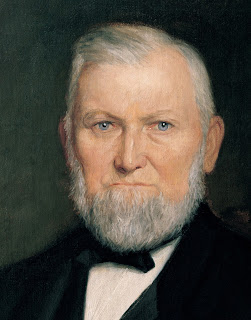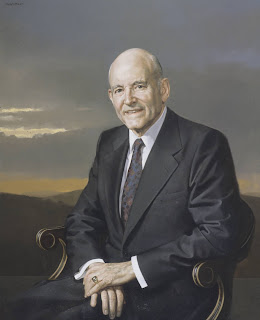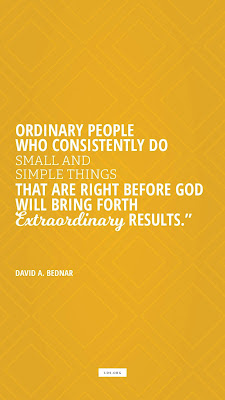 |
| “Decisions are constantly before us. To make them wisely, courage is needed.” —President Thomas S. Monson, “The Three Rs of Choice” Accessed June 15, 2020 from https://www.churchofjesuschrist.org/media/image/meme-monson- decisions-courage-b3efb67?lang=eng |
Unintentional noncompliance results in drift or “creeping change”, as its termed in manufacturing practices. Eventually, it also results in total apostasy.
Neglect, carelessness, laxness and deliberate disobedience pave the foundation for apostasy
James E. Faust cautioned:
On this matter, we urge you presiding brethren to seek the Spirit of God, to study and be guided by the scriptures and the General Handbook of Instructions. Church discipline is not limited to sexual sins but includes other acts such as murder, abortions, burglary, theft, fraud, and other dishonesty, deliberate disobedience to the rules and regulations of the Church, advocating or practicing polygamy, apostasy, or any other unchristianlike conduct, including defiance or ridicule of the Lord’s anointed, contrary to the law of the Lord and the order of the Church.” [My emphasis]Straying from the truth by changing existing ordinances and adding others is what characterized the Great Apostasy. This creeping change in the early Church was labeled “apostasy.” There is no reason to label it anything differently in the modern Church. It was apostasy then and it IS apostasy now.
Consider this counsel from Wilford Woodruff:
 |
| Wilford Woodruff, by H. E. Peterson; GAK 509; Our Heritage, 98–102. President Wilford Woodruff served as the fourth President of the Church from 1889 to 1898. Accessed June 15, 2020 from https://www.churchofjesuschrist.org/media /image/wilford-woodruff-39a5f87?lang=eng |
“Wilford Woodruff, while serving in the Quorum of the Twelve, said: “Brother Joseph used to counsel us in this wise: ‘The moment you permit yourselves to lay aside any duty that God calls you to perform, to gratify your own desires; the moment you permit yourselves to become careless, you lay a foundation for apostasy.”
“He then remarked that any man, any elder in this Church and kingdom, who pursued a course whereby he would ignore or, in other words, refuse to obey any known law or commandment or duty—whenever a man did this, neglected any duty God required at his hand in attending meetings, filling missions, or obeying counsel, he laid a foundation to lead him to apostasy and this was the reason those men had fallen. They had misused the priesthood sealed upon their heads. They had neglected to magnify their calling as apostles, as elders. They had used that priesthood to attempt to build themselves up and to perform some other work besides the building up of the kingdom of God.”We know that subtle, often innocuous, changes can result in massive and devastating shifts over time. In the early Church, these shifts obliterated the true authority to act in God’s name. This resulted in the Gospel being lost for centuries.
We know this will not happen again, because we have been promised that it will not. But, individuals can, and will, lose their way. Unfortunately, this can occur while they serve in Church callings and can affect their behavior while serving.
Seemingly small changes or alterations may seem innocent at first and not a cause for real alarm. But, ultimately, they will have massive consequences.
Traditions should be carefully examined in the Church
Often these shifts solidify into “traditions.” Sister Julie Beck has remarked that tradition is probably the worst reason for conducting any Church activity.
Seemingly small changes or alterations may seem innocent at first and not a cause for real alarm. But, ultimately, they will have massive consequences.
Traditions should be carefully examined in the Church
Often these shifts solidify into “traditions.” Sister Julie Beck has remarked that tradition is probably the worst reason for conducting any Church activity.
 |
| A portrait of Julie Bangerter Beck, who was the 15th general president of the Relief Society from 2007 to 2012. Accessed June 15, 2020 from https://www.churchofjesuschrist.org/media/image/sister-julie-b-beck- lds-85dc2f8?lang=eng |
Years ago there was a little rule I made for myself that I think is pretty applicable to everyone. A good reason to have a ward activity or a stake activity is because we need it and it will strengthen our families and individuals. A bad reason to have an activity is because it’s a tradition or there’s a certain holiday we have to celebrate. When we talk about gospel patterns, we know the needs. Let’s plan the activities around those needs, and if something was a wonderful activity last year, it doesn’t mean we need to build it into a tradition.In 1998, Richard G. Scott gave a serious and heartfelt Conference address about “false traditions". Tradition is simply doing things the way they have always been done, or how you think they have been done.
He quotes an address from Howard W. Hunter:
 |
A portrait of Howard W. Hunter, who was the 14th President of the Church from 1994 to 1995; painted by William F. Whitaker Jr. Accessed June 15, 2020 from https://www.churchofjesuschrist.org |
Throughout your life, you will be faced with many choices. How well you select among the alternatives will determine your success and happiness in life. Some of the decisions you will make will be absolutely critical and can affect the entire course of your life. Please measure those alternatives against the teachings of Jesus Christ.... I suggest that you place the highest priority on your membership in the Church of Jesus Christ. Measure whatever anyone else asks you to do, whether it be from your family, loved ones, your cultural heritage, or traditions you have inherited—measure everything against the teachings of the Savior. Where you find a variance from those teachings, set that matter aside and do not pursue it. It will not bring you happiness” (“Counsel to Students and Faculty,” Church College of New Zealand, 12 Nov. 1990).
When you begin a new calling, one of the most dangerous things you can do is simply continue doing what has been done by your immediate predecessor or what you are used to being done by people in this calling.
We should all access the Handbook instructions that apply to our new calling, as well as any additional guidance. This should be our guide. Once we are fluent in official guidelines, then we can consider continuing actions that are already in place. If prior actions conflict with Church guidelines, they should be abandoned.
 | |
| “The course of our lives is not determined by great, awesome decisions. Our direction is set by the little day-to-day choices which chart the track on which we run.”—President Gordon B. Hinckley, “Watch the Switches in Your Life” Accessed June 15, 2020 from https://www.churchofjesus christ.org/media/image/meme-hinckley-direction-choices-track-14a5511?lang=eng |
The Handbook of Instructions
The Handbook is the policies and procedures manual for the Church. It is now online in its entirety and available to anyone.
We can be confident it will be consistent with revealed scripture. Our only concern should be in acting in harmony with it. Reliance on it can prevent creeping change. Ignoring it will result in creeping change.
From my lifetime in the Church, I have a healthy respect for Church guidelines. I have come to realize the wisdom in them. If I do not fully understand them, I follow them anyway. Top Church leaders have good reasons for what they do. I am not about to substitute my wisdom for theirs. To do so would elevate my wisdom above theirs.
Modern Church history is littered with the carcasses of people who thought they knew better than the designated church leaders, as well as their notions that they were indispensable to the work. We can learn from their bad examples.
From my lifetime in the Church, I have a healthy respect for Church guidelines. I have come to realize the wisdom in them. If I do not fully understand them, I follow them anyway. Top Church leaders have good reasons for what they do. I am not about to substitute my wisdom for theirs. To do so would elevate my wisdom above theirs.
Modern Church history is littered with the carcasses of people who thought they knew better than the designated church leaders, as well as their notions that they were indispensable to the work. We can learn from their bad examples.
Apostasy across the ages
Some years ago I was called to teach Gospel Doctrine during an Old Testament year. My duties began during the days of Samuel, the prophet. Nearly all the Old Testament from that time to the end dealt with the Church itself straying from the truth, often because no one was accessing the actual law itself.
In New Testament times, this creeping change corrupted the early Church. Review this description of what happened in the early church:
 |
“Obedience is a choice. It is between our own limited knowledge and power and God’s unlimited wisdom and omnipotence.”—Elder L. Tom Perry, “Obedience through Our Faithfulness” Accessed June 15, 2020 from https://www.churchofjesus |
Some years ago I was called to teach Gospel Doctrine during an Old Testament year. My duties began during the days of Samuel, the prophet. Nearly all the Old Testament from that time to the end dealt with the Church itself straying from the truth, often because no one was accessing the actual law itself.
In New Testament times, this creeping change corrupted the early Church. Review this description of what happened in the early church:
During the Apostasy, many ordinances were altered or added without proper authority. The Church allowed infant baptism and baptism by sprinkling or pouring, instead of by immersion. Pagan influences and philosophies of the time crept into the Church—such as burning incense, celibacy (the clergy remaining unmarried), and the belief that the body was evil and that God did not have a body. The honoring of martyrs turned to superstition and worship.
Because of the wickedness within the Church, the gifts of the Spirit ceased and people began to deny true spiritual gifts. Without revelation, Church organization changed through the government of men, instead of through inspiration from God. Church offices were bought, sold, and voted on.Keep Dr. Richard O. Cowan's concentric circles of authority in mind
So, what is the solution? Rely first on the scriptures, stick to the Handbook and follow what a religion professor of mine, Dr. Richard O. Cowan, taught me in a modern Church history course at BYU, to follow concentric circles of authority.
He described it this way. Think of circles within circles. At the very heart of all the circles are the scriptures and revelation from current prophets. Surrounding that core is Conference addresses by General Authorities and church curriculum materials. Church magazines are in a circle surrounding that.
Once you get outside the circle of sources coming directly from the Church, you are in trouble.
The further you get from the core circle, the more questionable your sources are – this includes commentary by Church members on blogs*, for example, books by individual members, etc.
Dr. Cowan taught us to never stray far from that core. I always keep these concentric circles in my mind when evaluating others’ ideas.
Dr. Cowan taught us to never stray far from that core. I always keep these concentric circles in my mind when evaluating others’ ideas.
 |
| “Ordinary people who consistently do small and simple things that are right before God will bring forth extraordinary results.”—Elder David A. Bednar, “By Small and Simple Things Are Great Things Brought to Pass” Accessed June 15, 2020 from https://www.church ofjesuschrist.org/media/image/meme-bednar-ordinary-people-simple -results-870a4d2?lang=eng |
If we know someone is trying to change something intentionally, then usually our antennae go up.
However, our own laxness, carelessness and unconcernedness can innoculate us against change that is happening around us that shouldn't be.
Creeping change can occur with members. Local leaders should be overseeing and monitoring what is going on. When leaders are corrupt; then change often starts galloping.
Creeping change can occur with members. Local leaders should be overseeing and monitoring what is going on. When leaders are corrupt; then change often starts galloping.
*If you are reading this and you haven't studied scriptures or reviewed the most recent General Conference talks today, you have no business being on this blog!
Continue reading at the original source →



